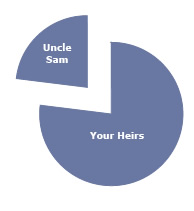A Common Misconception
Many people think that when federal estate taxes are payable, Uncle Sam simply
takes his slice of their estate "pie," leaving the balance for the estate owner's heirs.
Your Estate

While this result would be bad enough, what actually happens is even worse!
In Reality
The federal estate tax is a TRANSFER TAX imposed on the privilege of transferring
assets at death. The amount of tax payable is measured by the VALUE of the assets
transferred from the estate to the heirs.
What this means is, while the estate tax is levied on the value of assets transferred,
the estate tax CANNOT be satisfied simply by transferring a percentage of estate
assets to the IRS.
Instead, your estate must pay the federal estate tax in CASH, and it generally must
pay it in NINE months! It may, however, be difficult, if not impossible, to liquidate
sufficient non-liquid assets in order to pay the tax in cash.
Estate administrative costs must generally be paid in cash as well.
How difficult would it be to convert 10 PERCENT to 60 PERCENT of your
estate to CASH in just NINE MONTHS?
Potential Solutions
There are
FOUR ways to provide your estate with the liquidity needed to meet its cash obligations.
- 100% Method
You could accumulate enough cash in your estate to pay estate settlement
costs outright. Rarely, however, does a successful person accumulate such
large sums of cash. Instead, the reason for financial success is usually due
to the investment of cash in appreciating assets, rather than accumulating
it in a bank.
- 100% Plus Method
Your estate could borrow the cash needed to pay estate settlement costs.
This, however, only defers the problem, since the money will then have to
be repaid with interest.
- Forced Liquidation Method
Your estate could liquidate sufficient assets to pay estate settlement costs.
Keep in mind, however, that a forced liquidation may bring only a small
fraction of the true value of your assets if there is not a ready market. In
addition, sales expenses are bound to be incurred.
- Discount Method
Assuming you qualify, you can arrange now to pay your estate tax bill with
life insurance dollars. For every dollar your estate needs, you can give an
insurance company from approximately one to seven cents a year,
depending on your age and health. No matter how long you live, it is
unlikely you will ever give the insurance company more than 100 cents on
the dollar. In addition, the life insurance policy can frequently be structured
to accommodate your unique premium payment requirements.
Ask Yourself
Does it make sense to pay all of your estate settlement bill from estate assets within
nine months of death?
OR..
Does it make more sense to set aside one to two percent of your estate each year
now, while you are still in control?
Regardless of your age, it is a fact
that using life insurance is frequently
the most economical method of
providing needed estate liquidity.
 Contact Us
Contact Us  Contact Us
Contact Us 
